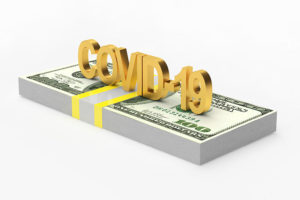Self-Employed Individuals and Independent Contractors Are Eligible For New Paycheck Protection Program Loans
 The Paycheck Protection Program (PPP) established by the recently passed Coronavirus Aid, Relief, and Economic Security (CARES) Act provides qualifying small businesses impacted by the COVID-19 pandemic with low-interest – and potentially forgivable – SBA loans that they can use to cover payroll costs for their workforce as well as for other operational costs such as rent, interest on mortgage obligations, and utilities.
The Paycheck Protection Program (PPP) established by the recently passed Coronavirus Aid, Relief, and Economic Security (CARES) Act provides qualifying small businesses impacted by the COVID-19 pandemic with low-interest – and potentially forgivable – SBA loans that they can use to cover payroll costs for their workforce as well as for other operational costs such as rent, interest on mortgage obligations, and utilities.
While traditional employers with less than 500 employees will significantly benefit from this program, so too can individuals who operate their business as a sole proprietorship or work as an independent contractor. PPP loans may also be available for “eligible self-employed individuals,” defined as individuals who regularly carry on a trade or business and would otherwise be able to receive paid leave if employed by someone other than himself or herself.
Eligible self-employed individuals, independent contractors, or sole proprietors can apply for a PPP loan and use the proceeds in the same way as other qualifying business entities can. The maximum amount such individuals can borrow under the program will also be determined in the same way as it is for other employers. Specifically:
- Maximum amount available: Qualifying borrowers can obtain a PPP loan for 2.5 times their average monthly payroll costs based upon the prior year’s expenses, up to a maximum of $10,000,000 (subject to an accommodation for seasonal business loan applicants and those applicants who were not operating their business in the prior year).
- Documentation required: Applicants for these loans must provide documentation to support their claimed eligibility, including payroll tax filings reported to the IRS, Form 1099–MISC, and income and expenses from the sole proprietorship, as determined by the Administrator of the SBA and the Secretary of the Treasury.
- Allowable uses for PPP loan proceeds: Sole proprietors, independent contractors, or self-employed individuals can use the loan proceeds for the same specific“allowable uses” that apply to other business entities. These include:
- payroll costs;
- costs related to the continuation of group health care benefits during periods of paid sick, medical, or family leave, and insurance premiums;
- employee salaries, commissions, or similar compensations;
- payments of interest on any mortgage obligation (which shall not include any prepayment of or payment of principal on a mortgage obligation);
- rent (including rent under a lease agreement);
- utilities; and
- interest on any other debt obligations incurred before the covered period.
PPP loans used for allowable purposes between February 15, 2020, and June 30, 2020, and that meet other simple requirements may be eligible for forgiveness and may not need to be repaid. All self-employed individuals should talk with their lender immediately to see if they can apply for these PPP loans through that lender, or whether they need to speak with another bank or credit union.
Click here to complete and download the Paycheck Protection Program application.
Sole Proprietors and Independent Contractors: Call Us for Assistance With Loans Related to COVID-19
We know this is an unprecedented, unnerving, and uncertain time for business owners. Kreis Enderle remains steadfastly committed to providing guidance, counsel, and advocacy to help our clients weather the storm.
If you have questions regarding obtaining loans through the Paycheck Protection Program or have any other concerns or issues related to the COVID-19 pandemic, please contact the Business Law Practice Group at Kreis Enderle today.
